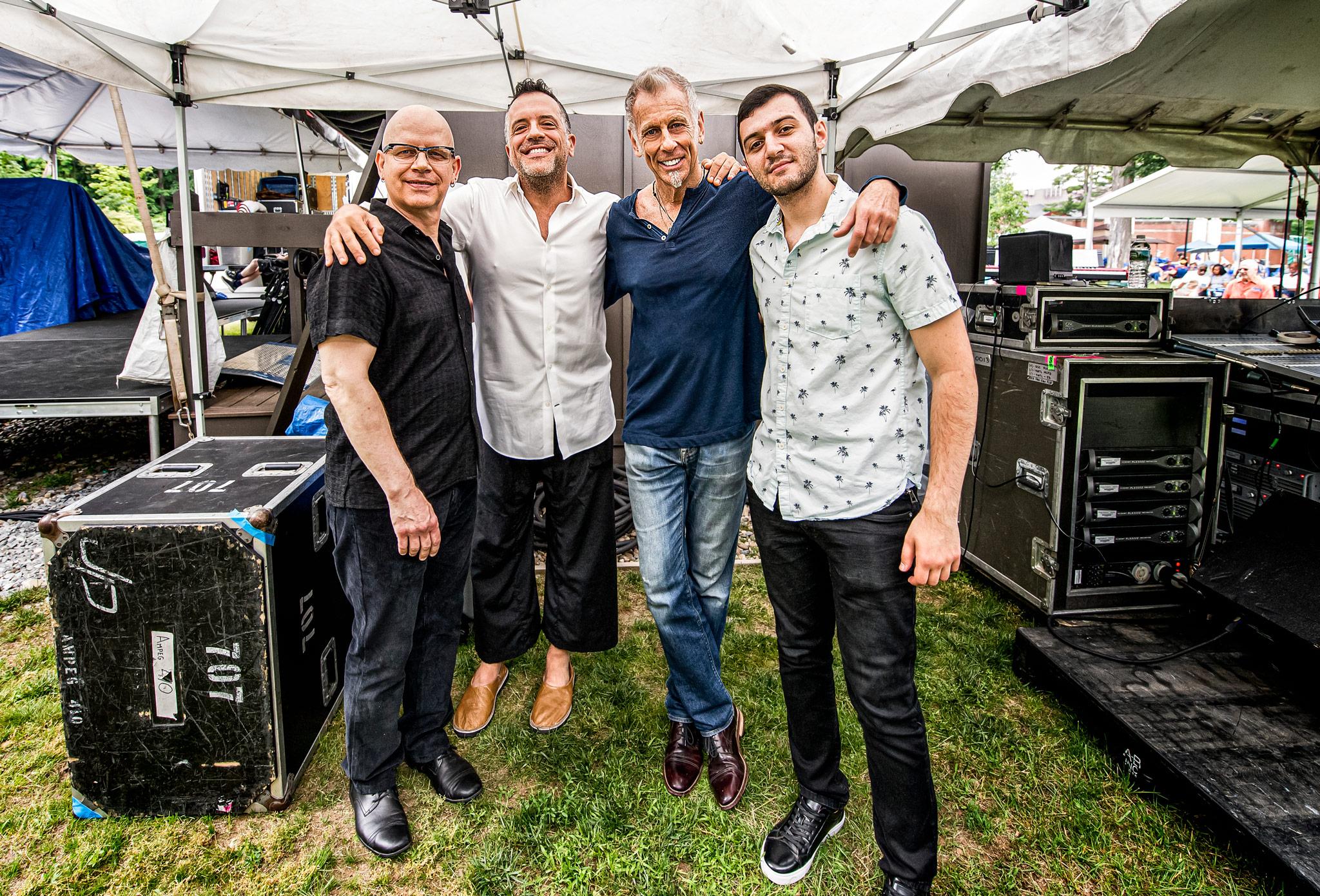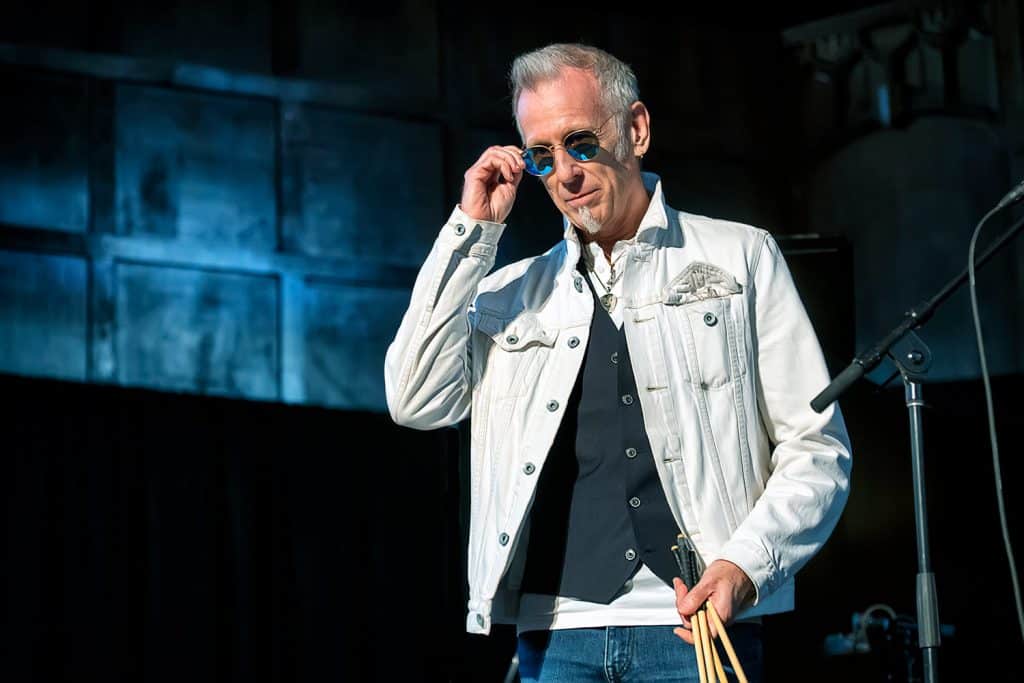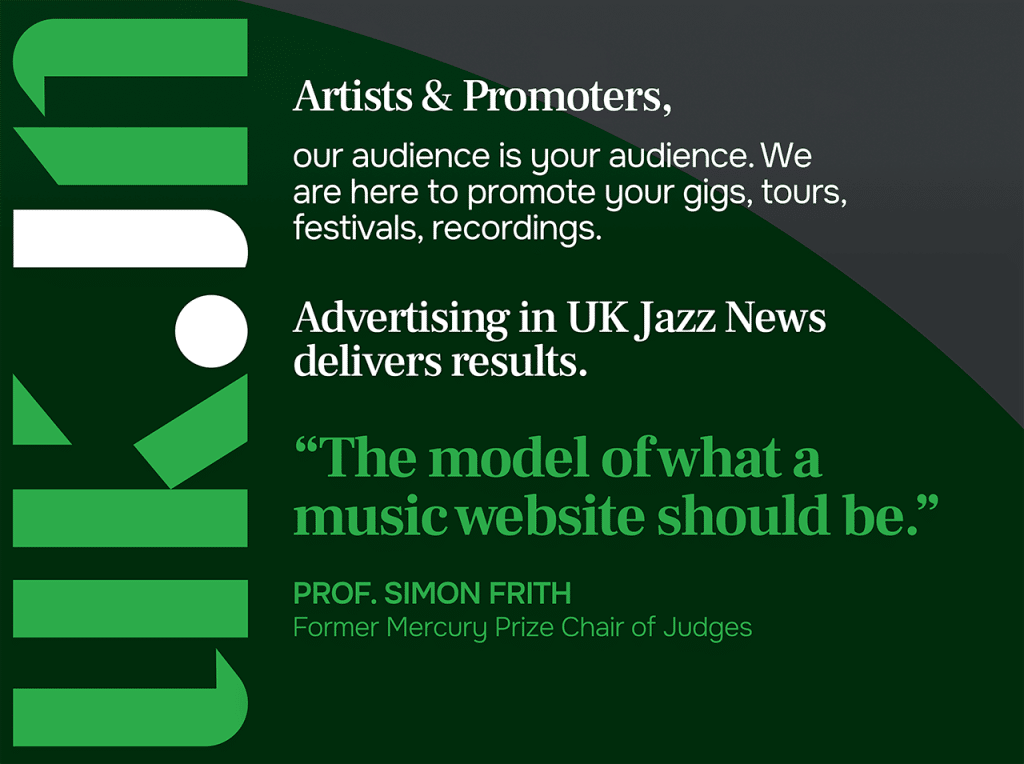“I have a long relationship with Ronnie Scott’s,” remarks vibraphonist Joe Locke, who next plays there with his working American quartet on October 29, one day before the venerable London jazz club celebrates its 65th anniversary. As on his last two UK visits, Locke will end this run – which begins with master classes at the Royal Academy of Music on October 15-16, followed by six concerts and a master class during a 10-day Italian sojourn – at Zeffirelli’s Jazz Room in Ambleside.
“I’ve always loved playing at Ronnie’s,” Locke continues. “Of course, I miss the old guard, and I miss ensconcing myself in Soho for a six-night run at the club, which I always used to do. Oftentimes I’d follow Roy Ayers’ residency and arrive in London a day early, to catch Roy’s last night. It’s always been one of the preeminent clubs in the world, and we’re always warmly welcomed.”
He’ll project a decidedly different ambience than the six-night residence in 2005, which featured fellow mainstem jazz masters Mike LeDonne (piano), Bob Cranshaw (bass) and Mickey Roker (drums), and resulted in the inexorably swinging, jazz radio chart-topping Milt Jackson tribute, Rev-elation (Sharp-9). Twenty years later, Locke, with pianist Jim Ridl and bassist Lorin Cohen from his multi-generational American working band, along with Alyn Coster (subbing for regular drummer Samvel Sarkisyan), will navigate repertoire from his summational album, Makram (Circle 9, 2023). Makram spans standards to the leader’s rhythmically challenging, harmonically dense post-bop compositions, as well as music from Subtle Disguise (Origin, 2018), on which David Binney (alto saxophone) and Adam Rogers (guitar) augment the group at various points, as does singer-guitarist Raul Midon on three songs.

Locke also intends to perform “a contemporary, very masked version of ‘Airegin’” and a song called ‘Is There A Heart In This House’, that he dedicates to the prominent civil rights activist Reverend William Barber. Both pieces appear on a forthcoming Criss Cross album by Vladimir Kostadinovic, the drummer on the Italian gigs, who developed simpatico with Locke in Amaranth, a collective Euro-based quartet with bassist Ameen Saleem and alto saxophonist Jaka Kopač. Amaranth’s debut album is scheduled for imminent release.
“Everyone is deeply rooted in the jazz tradition but has very eclectic tastes, which comes across in the range of music we play,” Locke says of his quartet. “They can deal with a lot of compositional stuff and also swing hard and groove, which I’m looking for to get the music across. I love that each [player] individually has a lot of history in their playing. Jim Ridl loves Oscar Peterson and Wynton Kelly, but he’s also very much a modernist. The same for Lorin Cohen, who’s really into Ray Brown, but also plays great electric bass and is into all styles. The same for Alyn and Vladimir as well as Samvel – super-smart, high-end players who can fill the formidable role of the drums in my music.”
“Often I go to Europe as a guest with someone else’s band or meet a rhythm section there and do a tour that’s rather quickly put together. This is my first opportunity in ages to bring my core band playing music that’s been gestated and realised over a period of time. So I feel we’ll have something really well-sculpted to present.”
Locke last visited the UK in January, mixing master classes and performances in London and Birmingham with the incomparable woodwindist Tim Garland and pianist Jason Rebello – who was filling the large shoes of Geoffrey Keezer, who has been for the last 25 years the third member of the beyond-category chamber trio Storms/Nocturnes. Locke and Keezer have also played in various quartet and duo endeavours, and they share a long-standing relationship with tenor saxophonist Tommy Smith and his Scottish National Jazz Orchestra. Another more recent high-level UK collaborator is pianist Gwilym Simcock, a partner on several occasions since the 2010s.
“The UK scene seems very healthy to me,” Locke says. “I’m impressed by the influx of inspiring young musicians, such as Helena Kay, Jonny Mansfield, Ben Shankland and Emma Rawicz, to name but a few.” Among the UK or European vibraphonists catching Locke’s ear are Lewis Wright (“a monster player”) and Jim Hart (“one of my favourites in the world”); he adds that Warren Wolf, Simon Moullier and Joel Ross are “absolutely transcendent players who honour the music, honour the tradition, and look forward and push the music forward, each in their own unique way.”
“When I moved to New York in 1981, there were other very good vibes players, but I think myself and Steve Nelson were the young voices coming heavily out of Milt Jackson and Bobby Hutcherson and the jazz tradition,” Locke continues. “Most vibes practitioners couldn’t hold their own with the great pianists, trumpet players, guitarists and saxophonists of the time. I think because of Gary Burton’s influence, a lot of them were weighted down trying to learn how to play ‘Waltz for Debby’ with four mallets instead of just thinking about playing a good linear solo on a blues. That’s changed. I’ve been inspired by the state of the vibraphone today, because there’s a plethora of really good improvisers who would have been great on whatever instrument they chose, but happened to choose the vibraphone. It’s hard to transcend the coldness of the vibraphone, but each one has found a way to make poetry on the instrument.
“I’m a champion of the younger players, because playing the vibes is not an easy path. There’s an extra level of difficulty just because the instrument is unwieldy. So when I see a young vibes player doing well and getting their music out there, it makes me happy.”
It’s clear that Locke’s discursive musical path – along with his legendarily fast hands, precise attack and warm, expansive tone; his expansive harmonic imagination; his command of multiple genres, ranging from swing to post-bop to fusion to avant; and not least, his charismatic stage presence – has influenced the aesthetic development he discerns among his younger legatees. Simcock told UK Jazz News in 2020: “It’s clear how much love and passion Joe puts into what he plays. It’s genuine love for playing music, not affected in any way. Putting ourselves on the line like that is really the best we can do as musicians. Working with Joe has been a great lesson in how to do this.” In a Downbeat Blindfold Test about a decade ago, Warren Wolf – who’s performed several two-vibraphone concerts with Locke in recent years – called Locke “one of the true legends of the instrument.”
Legend or not, Locke – who was born six months before Ronnie Scott’s opening night – must uphold the high bar he’s set on his physically demanding instrument every time he performs. Towards that end, he regularly lifts weights, as he did directly before our conversation, which transpired as he undertook a daily five-mile walk in the woods around his central New Jersey home.
“I feel in better shape now than in my early 30s,” Locke said, not sounding even slightly winded. “I haven’t slowed down at all. I’m grateful for my good health. I still need to practise as much as I ever did, because, as I tell anyone who asks, I’m only as good as the time I’m putting in on the instrument. What I work on most is language, vocabulary, and how to express what I want to say artistically. I have a bigger palette now. When I want to express something, I know how to get to the heart of it a little more easily than I once did. Sometimes that means playing a lot of notes. Sometimes it means knowing how to not play very many notes to make the statement you want to make. Maybe my development over more recent years, as I’ve gotten older, is learning how to edit and say specifically what I want to say without too much searching.”



